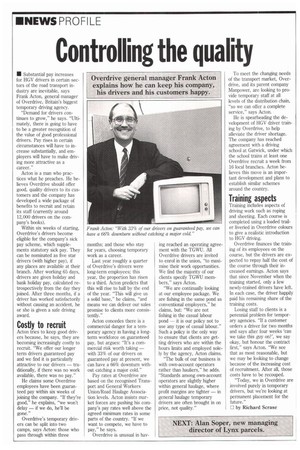Controlling the quality
Page 12

If you've noticed an error in this article please click here to report it so we can fix it.
Overdrive general manager Frank Acton explains how he can keep his company, his drivers and his customers happy. j
• Substantial pay increases for HGV drivers in certain sectors of the road transport industry are inevitable, says Frank Acton, general manager of Overdrive, Britain's biggest temporary driving agency.
"Demand for drivers continues to grow," he says. "Ultimately, there is going to have to be a greater recognition of the value of good professional drivers. Pay rises in certain circumstances will have to increase substantially, and employers will have to make driving more attractive as a career."
Acton is a man who practices what he preaches. He believes Overdrive should offer good, quality drivers to its customers and the company has developed a wide package of benefits to recruit and retain its staff (currently around 12,000 drivers on the company's books).
Within six weeks of starting, Overdrive's drivers become eligible for the company's sick pay scheme, which supplements statutory sick pay. They can be nominated as five star drivers (with higher pay), if any places are available at their branch. After working 65 days, drivers are given holiday and bank holiday pay, calculated retrospectively from the day they joined. After three months, if a driver has worked satisfactorily without causing an accident, he or she is given a safe driving award.
Costly to recruit
Acton tries to keep good drivers because, he says, they are becoming increasingly costly to recruit. "We offer our longer term drivers guaranteed pay and we find it is particularly attractive to our drivers — traditionally, if there was no work available, there was no pay."
He claims some Overdrive employees have been guaranteed pay within six weeks of joining the company. "If they're good," he explains, "we won't delay — if we do, he'll be gone."
Overdrive's temporary drivers can be split into two camps, says Acton: those who pass through within three months; and those who stay for years, choosing temporary work as a career.
Last year roughly a quarter of Overdrive's drivers were long-term employees; this year, the proportion has risen to a third. Acton predicts that this will rise to half by the end of the year. "This will give us a solid base," he claims, "and means we can deliver our sales promise to clients more consistently."
Acton concedes there is a commercial danger for a temporary agency in having a longterm workforce on guaranteed pay, but argues: "It's a commercial risk worth taking — with 33% of our drivers on guaranteed pay at present, we can have a 66% downturn without catching a major cold."
Pay rates at Overdrive are based on the recognised Transport and General Workers Union/Road Haulage Association levels. Acton insists market forces are pushing his company's pay rates well above the agreed minimum rates in some parts of the country. "If we want to compete, we have to pay," he says.
Overdrive is unusual in hay ing reached an operating agreement with the TGWU. All Overdrive drivers are invited to enrol in the union, "to maximise their work opportunities. We find the majority of our clients specify TGWU members," says Acton.
"We are continually looking at our employee package. We are fishing in the same pond as conventional employers," he claims, but: "We are not fishing in the casual labour pond — it is our policy not to use any type of casual labour." Such a policy is the only way to ensure that clients are getting drivers who are within the hours limits and employed solely by the agency, Acton claims.
"The bulk of our business is with own-account operators rather than hauliers," he adds. "Standards among own-account operators are slightly higher within general haulage, where profit margins are tighter — in general haulage temporary drivers are often brought in on price, not quality." To meet the changing needs of the transport market, Overdrive, and its parent company Manpower, are looking to provide temporary staff at all levels of the distribution chain, "so we can offer a complete service," says Acton.
He is spearheading the development of HGV driver training by Overdrive, to help alleviate the driver shortage. The company has reached agreement with a driving school at Gatwick, under which the school trains at least one Overdrive recruit a week from 16 local branches. Acton believes this move is an important development and plans to establish similar schemes around the country.
Training aspects
Training includes aspects of driving work such as roping and sheeting. Each course is completed using a loaded trailer liveried in Overdrive colours to give a realistic introduction to HGV driving.
Overdrive finances the training of its employees on the course, but the drivers are expected to repay half the cost of the course through their increased earnings. Acton says that since November when the training started, only a few newly-trained drivers have left. In each case, the driver happily paid his remaining share of the training costs.
Losing staff to clients is a perennial problem for temporary agencies. "If a customer orders a driver for two months and says after four weeks 'can we take this guy on?', we say okay, but honour the contract first," says Acton. "We see that as most reasonable, but we may be looking to change because of the increasing cost of recruitment. After all, those costs have to be recouped.
"Today, we in Overdrive are involved purely in temporary drivers, but we're looking at permanent placement for the future."
11 by Richard Scrase




















































































































































